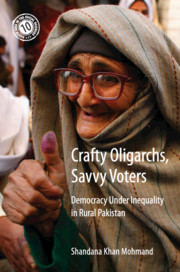Book contents
- Frontmatter
- Dedication
- Contents
- List of Tables and Figures
- Acknowledgements
- Glossary of Local Terms
- 1 Introduction: Rural Voters under Inequality in an Emerging Democracy
- 2 Colonial Constructs and Post-colonial Politics: 1849–2018
- 3 Landed Power in Sahiwal: From Domination to Intermediation
- 4 Local Competition and Bargaining Power: Conceptualising Political Engagement in Rural Punjab
- 5 Bargaining with Landlords: Comparing Political Engagement in Unequal Contexts
- 6 Structural Inequality and Variations in Political Engagement
- 7 When Do Shifts in Political Engagement Occur?
- 8 Conclusion: The Future of Pakistan's Democracy
- Annex 1 Chronology of Political Events in Pakistan
- Annex 2 Index of Political Engagement (IPE) Scores for 38 Villages
- Annex 3 Research Instruments
- Annex 4 Detailed Descriptions of Household Variables Used in Multivariate Regression Analysis
- Bibliography
- Index
7 - When Do Shifts in Political Engagement Occur?
Published online by Cambridge University Press: 26 April 2019
- Frontmatter
- Dedication
- Contents
- List of Tables and Figures
- Acknowledgements
- Glossary of Local Terms
- 1 Introduction: Rural Voters under Inequality in an Emerging Democracy
- 2 Colonial Constructs and Post-colonial Politics: 1849–2018
- 3 Landed Power in Sahiwal: From Domination to Intermediation
- 4 Local Competition and Bargaining Power: Conceptualising Political Engagement in Rural Punjab
- 5 Bargaining with Landlords: Comparing Political Engagement in Unequal Contexts
- 6 Structural Inequality and Variations in Political Engagement
- 7 When Do Shifts in Political Engagement Occur?
- 8 Conclusion: The Future of Pakistan's Democracy
- Annex 1 Chronology of Political Events in Pakistan
- Annex 2 Index of Political Engagement (IPE) Scores for 38 Villages
- Annex 3 Research Instruments
- Annex 4 Detailed Descriptions of Household Variables Used in Multivariate Regression Analysis
- Bibliography
- Index
Summary
The findings of the previous chapter establish a strong relationship between political engagement and structural inequality. Does this mean that the nature of political engagement is static across time, given that social structures change very slowly at least over the short term? Our cases tell us that this is not true. The main vote bloc leaders of Sahiwal and Tiwanabad are large landlords who, in the not too distant past, controlled more than just the political decisions of the members of their vote blocs. Over time their control has reduced due to various factors and their influence survives today as intermediaries and ‘agents’, rather than as the absolute maaliks that their fathers were. So, when and how do vote blocs change and what causes shifts in the way they are organised? This is the question that concerns us in this chapter. If a vote bloc organises largely around voters that are socio-economically dependent on their leader, when does this relationship change to one between patrons and clients? And if a vote bloc is organised around clientelistic linkages, when might its members start to collectivise around a social identity, or start to commonly identify instead with a certain political party?
These questions draw inspiration from one that is a primary concern for Stokes et al. (2013): when and how do countries transition from non-programmatic linkages between political parties and voters to more programmatic politics? The question I ask here about shifts in the organisation of vote blocs essentially provides the micro logic of the larger transition that Stokes et al. (2013) are concerned with. Its main aim is to identify the microprocesses of political change, especially under conditions of great inequality, that underpin democratisation at higher, more visible levels. If Pakistan's democratic prospects rely in any way on the establishment of more stable and direct links between voters and political parties that represent their collective interests without the intervening role of landed elites, then it follows that the key must lie in sighting and understanding shifts that occur within village politics.
We saw in the previous chapters that there is an inherent political tension between landed and landless groups within each village.
- Type
- Chapter
- Information
- Crafty Oligarchs, Savvy VotersDemocracy under Inequality in Rural Pakistan, pp. 217 - 246Publisher: Cambridge University PressPrint publication year: 2019



